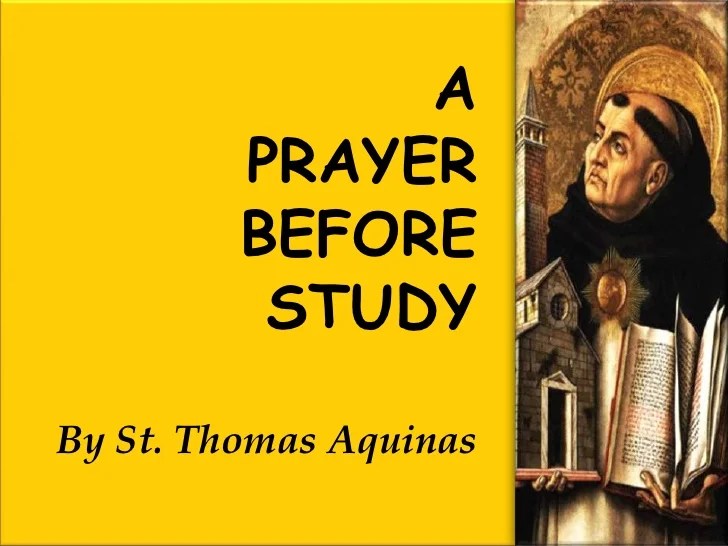St thomas aquinas prayer before exam – St. Thomas Aquinas’ Prayer Before an Exam is a beloved invocation sought by students and scholars for centuries, offering solace, guidance, and confidence in the face of academic challenges. This prayer, rooted in the rich traditions of Catholic education, serves as a timeless reminder of the power of faith and the importance of seeking divine assistance in our pursuits.
Throughout history, countless individuals have turned to this prayer for strength and clarity during exams, recognizing its ability to calm nerves, sharpen focus, and instill a deep sense of trust in God’s providence. By delving into the prayer’s structure, language, and symbolism, we can uncover its profound meanings and explore its practical applications in modern academic settings.
Introduction
St. Thomas Aquinas, a renowned Dominican friar and philosopher, is widely venerated as the patron saint of students and scholars.
His exceptional intellect and profound contributions to theology and philosophy have earned him a prominent place in the Catholic Church and beyond. The “Prayer Before an Exam,” attributed to St. Thomas Aquinas, has become a cherished tradition among students seeking divine guidance and assistance during their examinations.
Historical Context and Origins
The exact origins of the “Prayer Before an Exam” are shrouded in mystery, but its historical roots can be traced back to the medieval period.
During this time, students faced immense pressure to excel in their studies, particularly in the pursuit of religious knowledge and scholarship. The prayer is believed to have emerged as a heartfelt plea for divine assistance in overcoming the challenges of rigorous academic pursuits.
Analysis of the Prayer

The Prayer of St. Thomas Aquinas before an Exam is a powerful invocation for guidance and assistance during times of academic stress. Its structure, language, and symbolism reflect the deep faith and trust in God that characterized St. Thomas’s life and teachings.
Structure
The prayer is composed of three distinct sections:
- An opening invocation, in which the supplicant addresses God as “Almighty God.”
- A central body, in which the supplicant expresses his or her need for divine assistance and guidance.
- A concluding petition, in which the supplicant asks God to grant his or her request.
Language
The language of the prayer is simple and direct, reflecting the humility and sincerity of the supplicant. The use of words such as “help,” “guide,” and “illuminate” conveys a sense of urgency and dependence on God’s assistance.
Symbolism
The prayer also contains several symbols that reflect the Christian faith. The reference to “darkness” represents the challenges and obstacles that the supplicant faces in his or her studies. The request for “light” symbolizes God’s guidance and wisdom, which can dispel the darkness and lead the supplicant to success.
Practical Applications
The Prayer of St. Thomas Aquinas can be a powerful tool for students and scholars during exam preparation and test-taking. It provides a structured framework for seeking divine guidance, alleviating stress, and enhancing focus and confidence.
Alleviating Stress:The prayer’s focus on divine assistance and the acknowledgment of human limitations can help reduce anxiety and promote a sense of calm. By entrusting their worries to God, students can shift their focus away from negative thoughts and towards a more positive and confident mindset.
Promoting Focus
The prayer encourages students to ask for clarity of thought and understanding. By seeking divine illumination, they can improve their ability to concentrate, comprehend complex material, and recall information during exams.
Enhancing Confidence
The prayer instills a sense of confidence by reminding students that they are not alone in their struggles. It acknowledges the challenges of exams but also emphasizes the belief that with divine assistance, they can overcome them. This positive reinforcement can boost students’ self-esteem and motivate them to perform to the best of their abilities.
Historical and Cultural Impact
The prayer to St. Thomas Aquinas has had a profound impact on Catholic education and academic traditions for centuries.
Its popularity has grown steadily over time, becoming a staple in Catholic schools and universities worldwide.
Influence on Catholic Education, St thomas aquinas prayer before exam
- The prayer’s emphasis on intellectual clarity and spiritual guidance has resonated with Catholic educators.
- It has been used as a tool to foster a culture of academic excellence and faith integration.
- Many Catholic schools and universities incorporate the prayer into their daily routines, such as before classes or exams.
Influence on Academic Traditions
- The prayer has become a symbol of academic achievement and intellectual integrity.
- It has been recited by generations of students and scholars, seeking divine assistance in their studies.
- The prayer’s invocation of St. Thomas Aquinas, a renowned philosopher and theologian, adds to its significance within academic circles.
Comparative Analysis: St Thomas Aquinas Prayer Before Exam

The “Prayer Before an Exam” by St. Thomas Aquinas is a well-known invocation among Christian students seeking divine assistance during examinations. It shares similarities and unique features with other prayers and invocations used by students and scholars in various cultures and religions.
One common aspect is the acknowledgment of the importance of knowledge and wisdom in academic pursuits. In the Aquinas prayer, the supplicant implores God to “grant me a clear understanding and a retentive memory.” Similarly, in the Hindu tradition, students offer prayers to Goddess Saraswati, the deity of knowledge and wisdom, seeking her blessings for clarity and success in studies.
Unique Features
- Christian Context:The Aquinas prayer is explicitly Christian, invoking God, the Holy Spirit, and the Virgin Mary for assistance. This reflects the Christian belief in divine providence and the role of faith in intellectual endeavors.
- Focus on Grace:The prayer emphasizes the need for divine grace to supplement human effort. The supplicant asks for “grace to understand, to remember, and to expound” the material.
- Request for Protection:Aquinas includes a plea for protection from distractions and temptations that might hinder concentration during the exam.
Similarities
- Expression of Anxiety:Many prayers before exams express anxiety and nervousness about the upcoming test. In the Aquinas prayer, the supplicant confesses, “I am burdened with many sins and negligences.”
- Petition for Guidance:Students often seek divine guidance in understanding the material and performing well. In the Islamic tradition, students recite the “Dua for Knowledge,” which includes a request for Allah’s guidance and assistance.
- Hope for Success:Ultimately, these prayers convey a hope for success in the exam. The supplicant in the Aquinas prayer asks for “a perfect knowledge and a complete understanding.”
Adaptations and Variations

The “Prayer Before an Exam” has undergone various adaptations and modifications over time to accommodate different contexts and audiences. These adaptations reflect the evolving needs and preferences of students and scholars.
Specific Adaptations
- Shortened Versions:For time-constrained situations, shorter versions of the prayer have been developed, retaining its core message and essence.
- Language Translations:The prayer has been translated into numerous languages, making it accessible to students from diverse cultural and linguistic backgrounds.
- Digital Adaptations:With the advent of technology, digital versions of the prayer have emerged, allowing students to carry it on their mobile devices or access it online.
These adaptations demonstrate the flexibility and adaptability of the prayer, ensuring its continued relevance and usefulness for students seeking divine guidance and support during exams.
FAQ Explained
What is the significance of St. Thomas Aquinas as a patron saint of students?
St. Thomas Aquinas, known for his intellectual prowess and dedication to education, is revered as the patron saint of students, scholars, and universities. His writings and teachings have profoundly influenced Catholic theology and philosophy, making him a respected figure in academic circles.
How can the Prayer Before an Exam help students during exams?
The Prayer Before an Exam provides students with a sense of calm and confidence by reminding them of God’s presence and guidance. It helps alleviate anxiety, sharpen focus, and instill a belief in their abilities. By seeking divine assistance, students can approach exams with greater assurance and trust.
What are the key themes expressed in the Prayer Before an Exam?
The prayer expresses themes of trust in God’s providence, seeking guidance and clarity, overcoming anxiety, and acknowledging the importance of hard work and preparation. It encourages students to rely on God’s wisdom and strength while recognizing their own efforts in the pursuit of academic success.



